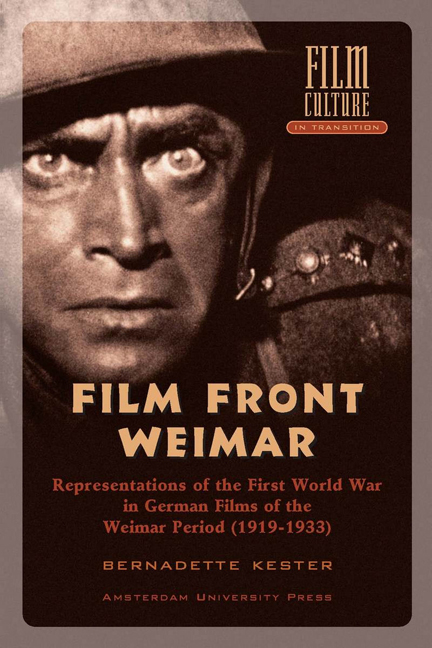 Filmfront Weimar
Filmfront Weimar Book contents
- Forntmatter
- Contents
- Preface and Acknowledgements
- Introduction
- Chapter 1 ‘Lehrreich Und Amüsant’ – Historical Films in the Period 1896-1933
- Chapter 2 ‘Die Legende von der Unschuld’ – Films about the Run-Up to the war, Especially 1914. DIE LETZTEN TAGE VOR DEM WELTBRAND
- Chapter 3 ‘Das Dokumentarische Gewinnt die Oberhand’ – Archival Footage and Constructions in War Films
- Chapter 4 ‘Wenn Wir Helden Wären, Wären Wir Schon Längst Daheim’– Realism and Anti-War Tendencies in Four Films
- Chapter 5 ‘Auf Dem Meere, Da Ist Der Mann Noch Etwas Wert’ – Films About the German Navy During The First World War
- Chapter 6 ‘Neid, Leid, Tränen – Das Ist Der Krieg’– Gender and War Films
- Epilogue
- Notes
- Credits Weimar War Films
- Archives and Libraries
- Bibliography
- Index of Names
- Index of Subjects
Chapter 4 - ‘Wenn Wir Helden Wären, Wären Wir Schon Längst Daheim’– Realism and Anti-War Tendencies in Four Films
Published online by Cambridge University Press: 15 January 2021
- Forntmatter
- Contents
- Preface and Acknowledgements
- Introduction
- Chapter 1 ‘Lehrreich Und Amüsant’ – Historical Films in the Period 1896-1933
- Chapter 2 ‘Die Legende von der Unschuld’ – Films about the Run-Up to the war, Especially 1914. DIE LETZTEN TAGE VOR DEM WELTBRAND
- Chapter 3 ‘Das Dokumentarische Gewinnt die Oberhand’ – Archival Footage and Constructions in War Films
- Chapter 4 ‘Wenn Wir Helden Wären, Wären Wir Schon Längst Daheim’– Realism and Anti-War Tendencies in Four Films
- Chapter 5 ‘Auf Dem Meere, Da Ist Der Mann Noch Etwas Wert’ – Films About the German Navy During The First World War
- Chapter 6 ‘Neid, Leid, Tränen – Das Ist Der Krieg’– Gender and War Films
- Epilogue
- Notes
- Credits Weimar War Films
- Archives and Libraries
- Bibliography
- Index of Names
- Index of Subjects
Summary
Films such as NAMENLOSE HELDEN (1925), WESTFRONT 1918 (1930), DIE ANDERE SEITE (1931) and NIEMANDSLAND (1931), like the war documentaries, can be related to New Objectivity. WESTFRONT 1918 especially showed ‘striking similarities to the basic doctrine of the New Objectivity’, according to Kracauer. These four films represent another approach to the war than has been discussed so far. Lacking archival footage, or making only limited use of it – with the exception of NAMENLOSE HELDEN, which appeared to have quite a lot archival footage – these films tried to get as close as possible to the western front experience by focusing on the personal experiences shared by a small group of soldiers. The confrontation with the home front was also included in these films. None of these four films were so-called neutral history lessons but representations of different subjective worlds of experience. Another similarity between the films was their anti-war tendency.
If we compare these films to the ‘documentary’ war films, we may well ask ourselves whether they presented a different perspective on the war. To what degree, for example, were the films different in terms of narration and cinematography? In addition, we may ask whether these anti-war films, in contrast to the ‘documentaries’, which mostly represented the official perspective on the war, can be considered ‘counter-histories’, and whether they did, as such, fulfil a demythologizing role.
Literary context: war literature
New Objectivity is often thought to have reached its high point round about 1929, but NAMENLOSE HELDEN, WESTFRONT 1918, DIE ANDERE SEITE and Niemandsland were nevertheless part of this cultural context. Perhaps only its tone of voice changed after 1929. While it was an aesthetic practice in principle, realism fulfilled a different function and gained prestige in a time of social, political and especially economic upheaval. According to some commentators, including Michael Gollbach and Modris Eksteins, the 1929 crisis prompted Germans from all walks of life to re-examine and come to terms with their war past for the first time. In this process, Gollbach says, an important role was played by war films and war novels, because of their mass appeal.
In the period 1928-1933, the last phase of the Weimar Republic, a boom occurred in the production of war literature.
- Type
- Chapter
- Information
- Filmfront WeimarRepresentations of the First World War in German Films from the Weimar Period (1919–1933), pp. 123 - 160Publisher: Amsterdam University PressPrint publication year: 2002


